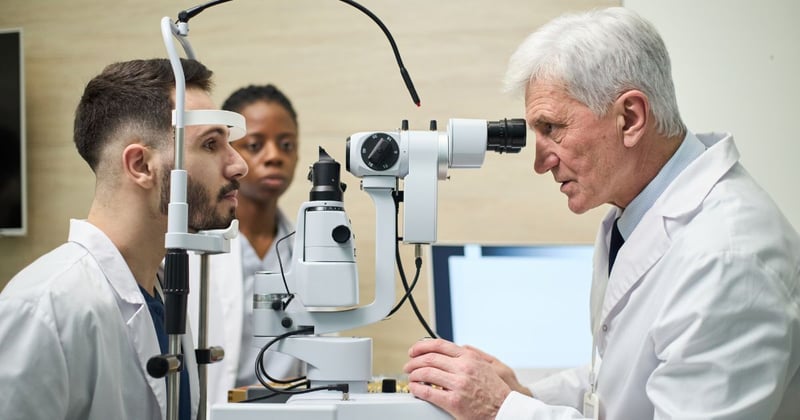An ophthalmologist is a MD or DO trained physician who has completed training that allows them to treat conditions that affect the eyes. In contrast to an optometrist, ophthalmologists can perform surgery and other procedures to correct medical conditions. They work in both a hospital and outpatient clinic setting. In order to become an ophthalmologist, one must complete college, attend medical school, and complete a three year ophthalmology residency. In this article we will discuss what an ophthalmologist is, what their work entails, their training path, salary and more.
- What is an Ophthalmology doctor?
What do Ophthalmology specialists do? - How to become an Ophthalmologist?
- How many years is Ophthalmology residency?
- How much money do Ophthalmologist physicians make?
- What subspecialties are available in Ophthalmology?
- How many years to become an Ophthalmologist?
- Is becoming an eye surgeon hard?
- Is Optometry better or Ophthalmology?
- Is an Ophthalmologist and an eye surgeon the same?
- Is Ophthalmology school the same as medical school?
- Is MCAT needed for Ophthalmology?
- Getting started in medicine
What is an Ophthalmologist?
An ophthalmologist is a medical professional who focuses on identifying and treating conditions that affect the eyes and vision. One of the ways in which they do this is by performing eye surgery. Ophthalmologists treat patients of all ages, from babies to the elderly, and handle a variety of eye issues. In addition to providing medical care, some ophthalmologists are involved in research related to the eyes and vision. They may research the causes and preventative measures for eye issues and work to create novel drugs and treatments for eye disorders.
What do Ophthalmologists do?
Ophthalmologists are medical doctors who specialize in diagnosing and treating vision and eye issues. They have extensive medical and surgical training, which allows them to diagnose and treat a larger spectrum of diseases than optometrists and opticians.
Some of the tasks that ophthalmologists regularly complete include:
- Performing eye surgery: This includes procedures such as cataract surgery, LASIK, muscle correction, and retinal detachment repair.
- Providing preventive eye care: Ophthalmologists can advise how to protect and patient’s eyes from disease and prevent damage in the future.
- Diagnosing and treating eye diseases and disorders: This includes conditions such as glaucoma, cataracts, macular degeneration, and diabetic retinopathy.
- Prescribing glasses and contact lenses: Ophthalmologists can prescribe glasses and contact lenses to correct vision problems.
- Conducting research: Many ophthalmologists are also involved in research to develop new treatments for eye diseases and disorders.
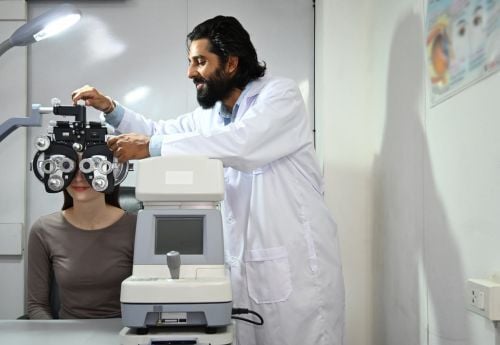
Ophthalmologist's education and training - How to become an Ophthalmologist
The route to becoming a ophthalmologist is rigorous and requires at least 12 years of education following graduation of high school. While there are numerous steps, large and small, the general steps include college, medical school, and residency. Continue reading for the seven in depth steps of how to become an ophthalmologist.
1. Complete a college degree: To become an ophthalmologist, students need a bachelor’s degree. Most medical schools do not require a certain college degree. However, if a college doesn’t have a pre-med program, it is recommended that one should major in a science-related field. During this time students should also complete undergraduate courses that will prepare them for medical school in subjects like biology or anatomy. Students should strive for a cumulative GPA of 3.5 or higher while pursuing an undergraduate degree as medical school admissions require strong marks for enrollment in their programs.
2. Prepare for, take, and score well on the Medical College Admission Test (MCAT): While in undergraduate school, one must study for the Medical College Admission Test (MCAT). The MCAT will assess students general scientific knowledge, critical thinking skills, and problem-solving abilities. There are many materials and resources available to help students prepare for this test. This test is typically taken by undergraduate students in their junior or senior year of study. As applying to medical school is very competitive, earning a strong MCAT score is necessary to make an application stand out.
3. Enroll and begin medical school: Students should begin putting together their medical school application nearly one year in advance as it has a lot of different components. After being admitted to medical school, students begin to learn the basics of medicine during in the first few years of medical school. This commonly includes courses like biochemistry, physiology, anatomy, and pathology. Following the first two years, the first board examination is taken. This is called the United States Medical Licensing Exam (USMLE) Step 1 for allopathic medical students and the Comprehensive Osteopathic Medical Licensing Exam (COMLEX) Level 1 for osteopathic students. Following this, students are able to participate in rotations where they’ll gain practical medical training and experience.
4. Complete clinical rotations: The last two years of medical school are spent in a hospital learning hands-on clinical skills. During this time, students collaborate with several medical professionals throughout different rotations. Attending and resident physicians train students and provide insight into the routine tasks carried out in the medical practice of all different medical specialties.
5. Complete the second board exam and apply for residency: After completion of the majority of rotations, the second COMLEX and USMLE board examinations should be taken. These tests will evaluate student’s clinical knowledge and test over education they have accumulated while working in the hospital.
6. Apply for and complete an internship: Some medical specialties require completion of an internship after graduating medical school but prior to starting residency in an area of your choosing. Ophthalmology is one of those specialties. Internship lasts a year. During this time physicians learn how to diagnose, treat, and regularly assess patients. After finishing the one-year internship, doctors can finally focus on ophthalmology.
7. Complete Ophthalmology residency: Ophthalmology residency lasts three years total. During these 36 months physicians will gain practical ophthalmology experience and learn to treat and identify patients’ illnesses, problems, and medical conditions. Physicians undergo a lot of education during this time. Along with gaining experience, they will attend lectures or seminars to learn more about treatments for various illnesses and conditions.
How many years Is Ophthalmology residency?
In the US, an ophthalmology residency takes three years to complete. However, a year of additional residency training, termed an intern year, must be completed prior to starting Ophthalmology residency for a total of four years in residency. Although it may vary from program to program an example of the breakdown of what residency entails is as follows:
Year 1: During this year, students often rotate through various ophthalmology subspecialties, including retina, cornea, glaucoma, and pediatric ophthalmology. The fundamental sciences of ophthalmology, such as anatomy, physiology, and pharmacology, are also taught to residents
.
Year 2: Residents continue to rotate across many subspecialties during this year and they begin seeing patients independently and carrying out simple surgeries.
Year 3: In the final year, residents continue to practice medicine with less and less oversight, performing surgical procedures and diagnosing and treating eye conditions. Additionally, senior residents may start instructing residents and medical students. Towards the end or after finishing their residency, graduates must sit for the Ophthalmology board exam to finally become board-certified ophthalmologists.
Ophthalmologist salary - How much do Ophthalmologists make?
There are several sources that accurately report physician’s salary. The first is Medscape. According to the 2023 Medscape Physician Compensation Report, Ophthalmologists make an average of $388,000. Another source, American Association of Medical Colleges (AAMC) reports salary for Ophthalmologists in academic medicine. According to AAMC Careers in Medicine an Ophthalmologists that is a assistant professor makes an average of $284,686, while an associate professor makes an average of $358,078, and a full professor makes an average of $405,656. No matter the environment that an Ophthalmologist works in, they are well-compensated.
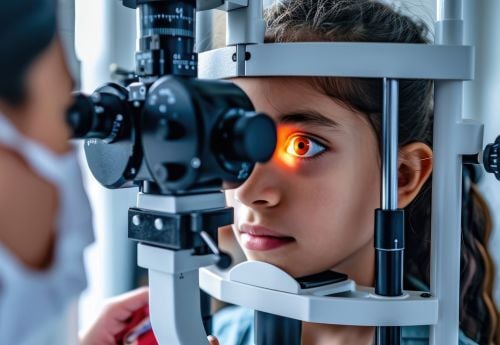
What fellowship subspecialties are available for an Ophthalmologist?
Fellowship is an optional year or two of training that ophthalmologists may choose to pursue after residency that allows they to practice in a more subspecialized area of medicine. Over the past fifteen years, the percentage of US ophthalmology residents who apply for fellowships has nearly doubled to over 65%. According to the Association of University Professors of Ophthalmology fellowship data for 2021, out of 440 fellowship applications by ophthalmology residents, 375 were matched (leaving 65 without a match). Of these, 297 graduates were from the US, 12 were from Canada, and 66 were from other countries.
The main Ophthalmology fellowships available in the US are:
- Glaucoma: This disease is due to high pressure within the eye which can harm the optic nerve and can cause blindness. Because glaucoma patients need constant monitoring of their eye pressure, glaucoma specialists often see their patients frequently. To control eye pressure, they might also perform surgery or use lasers.
- Pediatrics: Pediatric ophthalmologists treat eye diseases and vision problems in children. They may specialize in treating premature infants with retinopathy of prematurity, amblyopia (lazy eye), or strabismus (crossed eyes).
Neuro-ophthalmology: Neuro-ophthalmology is a field that combines ophthalmology and neurology. Neuro-ophthalmologists diagnose and treat eye diseases caused by neurological problems, such as brain tumors, strokes, and multiple sclerosis. - Oculoplastics: Oculoplastics is a field that deals with the medical and surgical treatment of the eyelids, orbit, and tear ducts. Oculoplastic surgeons may also perform cosmetic surgery on the eyes and face.
- Cornea, refractive, and anterior segment surgery: This field encompasses various conditions and procedures, from corneal transplants to laser vision correction. Cornea specialists treat various eye diseases, including corneal scarring and dystrophies. They may also perform refractive surgery to improve vision.
- Retina: Retina specialists treat diseases of the retina, the light-sensitive tissue at the back of the eye. Retina specialists may perform surgery to repair retinal detachments or treat macular degeneration.
How long does it take to become an Ophthalmologist?
In the United States, the path of becoming an ophthalmologist takes at least 12 years. In general this includes 4 years of undergraduate education, 4 years of medical school and 4 years of residency which includes a 1 year intern year and 3 years of ophthalmology residency. Some ophthalmologists may choose to pursue a fellowship in a particular specialty after finishing an ophthalmology residency. This can add one to two years of additional training.
The normal time frame for becoming an ophthalmologist is broken down as follows:
- Undergraduate college: During this time, biology, chemistry, and physics are the three most popular majors among ophthalmologists and other pre-medical students. Other required courses include English, physics, and math.
- Medical school: In med school, students spend 4 years learn the fundamentals of medicine by completing courses such as anatomy, physiology, pharmacology, and other subjects. Students also understand the basics of medicine including how to conduct physical examinations, and identify and treat ailments.
- Intern year of residency: Prior to starting ophthalmology residency doctors must complete one year of residency in either general surgery or internal medicine. This year is often called an intern year or preliminary year.
- Ophthalmology residency: This three-year time of study prepares physicians to practice ophthalmology. They begin learning the anatomy and physiology of the eye and then move onto learning to diagnose and treat optic diseases. Finally they learn to perform procedures and surgeries.
- Fellowship: Some ophthalmologists might choose pursue a fellowship in a specific specialization, such as glaucoma, cornea, or the retina. Fellowships usually last between one and two years.
Ophthalmologists can apply to be board-certified if they have completed all of the coursework and take the required exam. Board certification serves as proof that they have passed the rigorous criteria set by the American Board of Ophthalmology.
Is becoming an Ophthalmologist hard?
Yes becoming an ophthalmologist is very difficult. In fact, it is one of the most difficult medical subspecialties to match into. It is a very competitive process and not all medical students successfully match into the field, with only a 70% match rate. One of the reasons it is so competitive is due to its great lifestyle and pay. There is little to no weekend responsibility, call volume is typically low and physicians are primarily employed in a typical 8 to 5 job fashion.
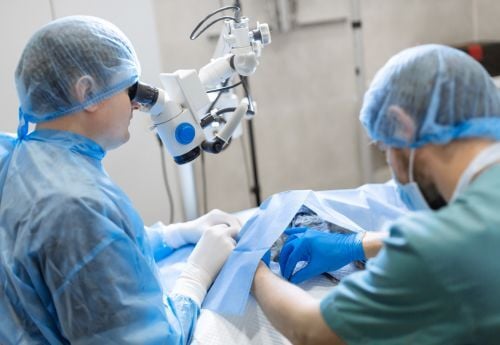
Is Ophthalmology better than Optometry?
Ophthalmologists and optometrists often work hand-in-hand thus, their job duties may be a source of confusion. Let’s start with discussing what services optometrists provide. The following are just some of the many eye care services and procedures that optometrists may provide:
- In-depth eye examinations: during these examinations optometrists will assess vision, check at the pressure in the eye, examine the optic nerve and retina, evaluate the eye muscles, and check the pupillary response.
- Treat common optical issues: this includes astigmatism, nearsightedness, and glaucoma.
- Write prescription for corrective lenses: including eyeglasses and contact lenses.
- Write prescriptions for other eye issues: this can include infections such as a bacterial infection or pink eye, medications to treat high intraocular pressure (glaucoma) or medications for dry eyes.
In addition to being trained to perform the same duties as optometrists, other duties ophthalmologists can perform include:
- Diagnosing and treating more complex eye conditions: including glaucoma, macular degeneration, and diabetic retinopathy. These conditions are more severe and can potentially cause patient to loose vision, thus they require more advance medical oversight.
- Perform complex procedures and surgery: some examples include cataract surgery, correction of lazy eyes, glaucoma surgery, removal or cancers, and laser operations.
- Order and interpret laboratory tests and imaging: MRIs and CTs (CAT) scans are some imaging tests ophthalmologists may order. They can also laboratory tests to help make diagnoses and guide treatment.
When should a patient visit the optometrist versus the ophthalmologist? This depends on the eye care requirements needed. Visit an optometrist if you experience a minor eye issue like nearsightedness, pink eye, or other small issues. You should visit an ophthalmologist if you have a more serious eye condition, such as glaucoma or macular degeneration. Optometrists undergo a shorter amount of training than ophthalmologists. However, visiting an ophthalmologist will likely be more costly than visiting an optometrist. Ultimately, your particular requirements and preferences will determine the ideal eye care provider for you. It is always recommended to check with either eye care specialist if you have any questions concerning your eyes.
Is an Ophthalmologist the same as an eye surgeon?
Yes, an ophthalmologist is the same thing as an eye surgeon. They can identify and treat various eye conditions, such as irregular astigmatism, glaucoma, and macular degeneration. However, they can also perform various eye procedures and surgeries, such as those for cataracts, glaucoma, and retinal detachment. Other eye professionals such as optometrist and opticians do not perform eye surgeries.
Is Ophthalmology school the same as medical school?
Ophthalmology school refers to the three year residency that physicians have to undergo in order to become ophthalmologists. Conversely, medical school is a four-year program that prepares doctors to become general practitioners. Although medical school will introduce students to the basics of some eye diseases, the study of the eye is covered in greater detail in ophthalmology residency/school. The anatomy and physiology of the eye, the diagnosis and treatment of eye illnesses, and how to perform eye surgery are all topics covered by ophthalmology residency.
Do you have to take the MCAT to be an Ophthalmologist?
Yes, almost all aspiring ophthalmologists must take the Medical College Admissions Test (MCAT), the entrance exam for medical school. A good MCAT score is necessary for a strong application to medical school. The Association of American Medical Colleges (AAMC), which developed and oversaw the MCAT, did so to provide medical schools with a uniform method of evaluating applicants’ qualifications and preparedness for medical school. The MCAT score, academic record, and supporting paperwork are all factors that medical school admissions committees consider when assessing applicants likelihood of having a successful medical career.
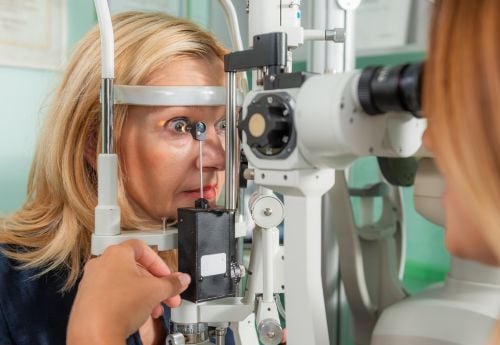
Getting started in Medicine
Now that you know the educational path to becoming an ophthalmologist and have read the answers to frequently asked questions about Ophthalmology as a medical specialty, the first step in starting a career in medicine begins with getting your MD degree at a medical school like the University of Medicine and Health Sciences. Start your application here: For more information about our school, please visit our offshore Caribbean medical school overview page.
Popular and Related Articles:
 |
Ophthalmologist vs Optometrist |
 |
D.O. versus M.D. |
 |
Family med and Internal med - what's the difference? |

Callie Torres is a double board-certified physician, a freelance health and medical writer, as well as an author of many peer-reviewed medical articles.













